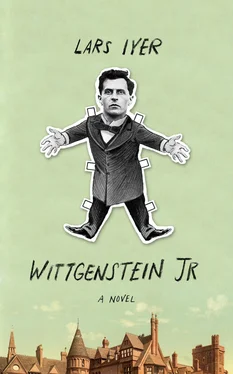We imagine the first scholars, expelled from Oxford, founding the new university in Cambridge. We imagine the first colleges growing out of boardinghouses. The first classes, teaching priests to glorify God, and to preach against heresy. The first benefactors, donating money for building projects. The first courtyard design, at Queens College, the chapel at its heart. The first libraries, built above the ground floor to avoid the floods. The lands, drained along the river, and planted with weeping willows and avenues of lime trees. The Backs, cleared, landscaped lawns replacing garden plots and marshland. Cambridge, raising itself above the water. Cambridge, lifting itself into the heavens of thought …
The rabbis thought that the old earth, Adam’s earth, was as flat as the Fens, Wittgenstein says. That it enjoyed a perfect climate, a perfect summer. No extremes of weather — no thunder or ice, no snow or hail. It was the Flood that changed it all, the rabbis thought. It was the Flood that altered the surface of the earth.
Noah’s ark came to rest on Ararat, Wittgenstein says. On the mountains. And Noah’s family, and all their animals, had to go down from the mountains into the new valleys, into the changeable weather of the world.
His brother used to say that thought is always of the heights, Wittgenstein says. Of the mountains. The thinker must soar above everything. Close to the truth. Close to eternal things.
His brother dreamt of a celestial logic, Wittgenstein says. A system of logic that blazed in the sky. A logical system at one with the order of things, that might be divined in the order of things. A logic that God Himself must have studied, before embarking on the Creation.
It is a terrible thing for the thinker to be sent down from the heights, his brother told him — to be forced to return to the world.
But what if thought is low , and not high? Wittgenstein says. What if the thinker’s place is below things, or with things, rather than above it all ?
What if to think is to sink , not to rise? Wittgenstein says. What if thinking is falling, failing, defeat? What if thought is the eclipse , not the sun? What if thought is mist , not clarity? What if thought is getting lost, not discovering? What if thought is waylessness, and not the way?
Perhaps the waters of the Flood are baptismal waters, Wittgenstein says. Perhaps there are joyful names for the disaster …
We take our leave at his door.
How much time he has spent on his own! Wittgenstein says.
No friends — not now , he’s always said to himself. Not until my work is done .
But perhaps he has made friends, he says. Perhaps we are his friends.
Walking back to our rooms.
EDE: Did we save him, do you think? Have we done something good?
ME: I think we have. I think we did.
EDE: Why did we bother, I wonder?
ME: Because he was flagging. Because he needed us.
EDE: You’re very tender, Peters. I hope you’ll be around to save me when the time comes. (A pause.) My God, we’ve been sober for two whole days!
Ede’s rooms. Titmuss arrives with a bottle of cognac; Doyle and Mulberry, with a bottle of absinthe.
Ede pours it all into a saucepan on the stove.
EDE: Gentlemen — did you know it’s possible to inhale alcohol? It bypasses the stomach and goes straight to the lungs and brain. No need for the middleman. Digestion’s strictly old school . You’re supposed to use air pumps to vaporise it, and then pour it over dry ice. But I don’t see why you can’t just heat it and sniff.
We crowd round the saucepan, breathing deeply.
Delirium. Both Kirwins have passed out. Their hyper-fitness makes them vulnerable, we agree. A bit like Bruce Lee.
MULBERRY: The room’s spinning.
DOYLE: My head’s about to fall off.
MULBERRY: Ede, why are there two of you?
DOYLE (panicked): Help me! I think I’m going to die.
EDE: There’s no way for the body to get rid of the alcohol. You can’t vomit your way out of this one, Doyle. You’ll just have to sit it out.
Titmuss launches into one of his India stories.
We lie, listening, in liquid-free drunkenness.
What a cliché Titmuss is!
Titmuss the India connoisseur. Titmuss moved by poverty and staring peasants. Moved by being moved by poverty and staring peasants. Supposing himself to have learnt a great Indian lesson , and — worst of all! — supposing himself to have a great Indian lesson to teach!
Only three weeks in India, and a new Titmuss was born. A heartfelt Titmuss, unknown to friends and family. A compassionate Titmuss with tears of joy in his eyes, as happy as the saints of God … A great-souled Titmuss, full of gap-year wisdom … A karmic Titmuss, dreaming of the thousand incarnations of the Titmuss-soul before him — of Titmussslugs and Titmuss-bats and Titmuss-ground-sloths. An eternal Titmuss — born an amoeba, born an ant, working his way up to a pasty Cambridge student.
The next day. The Kirwins, running through the snow.
EDE: Do you think the Kirwins have ever known despair?
The Kirwins are too vigorous to have known despair, we agree. Unless they are vigorous because of their despair. Unless the Kirwins nurse some deeply buried horror at life from which they flee in triathlons and Ironman contests …
The Kirwins’ tragedy is that there’s no war for them to die in, we agree. No chance of glory, no heroism. Ede imagines them charging some machine gun nest, without a thought for their safety. He sees Alexander Kirwin hurling back an enemy grenade, and Benedict Kirwin offering his body as a human shield to protect the soldiers behind him.
Of course, they could join up to fight in one of our stupid modern wars, Ede says. He imagines them blown up by roadside IEDs. But then, they’d learn to walk again on plastic legs, and salute visiting royalty with plastic arms, and enter the Paralympics, and head to the North Pole with Prince Harry. The Kirwins are irrepressible, Ede says.
The Kirwins will probably excel on the corporate stage , we agree. They’ll work their way up to the boardroom. But they’ll be haunted by a strange emptiness , we imagine — the same emptiness that makes them come to Wittgenstein’s classes. And one will die in a supposed shooting accident (a gun pressed accidentally to his temple: how was that possible?). The other, shortly afterwards, will fly his light aircraft into an electricity pylon. They’ll kill themselves without really knowing why …
EDE: Have you seen their motivational phrases? (Reading from the Kirwins’ Facebook page:) I can therefore I am. You are never too old to set another goal. If you can dream it, you can do it. By failing to prepare, you are preparing to fail. Either you run the day or the day runs you. Winners never quit and quitters never win. The harder the conflict, the more glorious the triumph. To begin, begin .
Ede says we should post some de motivational phrases on our Facebook pages. I can’t therefore I am. To be is to be condemned. The universe is a mistake. Hope is a kind of delirium. We don’t live even once. Dead days outnumber live ones. The use of philosophy is to sadden. Existence has never answered our questions. Death is the least of our problems .
Wittgenstein’s class. Thursday, three o’clock.
Silence. The hum of the computer. The cranking of an unbled radiator.
A poem on the board:
It is possible that to seem — is to be .
As the sun is something seeming and it is .
The sun is an example. What it seems
Читать дальше












